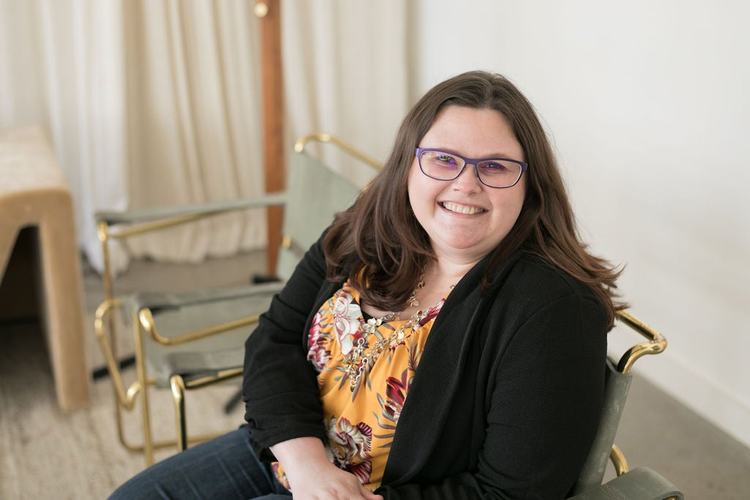Thinking differently about what “professionalism” means

For years, Adobe employee Jessica Michaels searched for reasons why there was a persistent disconnect between her own experience and the way others perceived her.
Then, at 39, she was diagnosed with autism spectrum disorder (ASD), and with attention-deficit/hyperactivity disorder (ADHD) a year later. “In that moment,” Jessica said about receiving the diagnosis, “my whole life made sense.”
In October, Adobe celebrated Disability Employment Awareness Month. Today, we connect with Adobe employee Jessica Michael, who talks about why she has embraced the unique way her brain works instead of trying to “overcome” it, and why she’s now working to increase understanding and opportunities for others like her.
What was your journey to receiving diagnoses for ASD and ADHD?
As a kid, I always got these mixed messages. I received praise for being smart, but I didn’t have any friends. I honestly just figured I had a bad time at school like a lot of people, but when I started working professionally, I got feedback like, “You’re exceeding every goal, but you’re failing because people think you’re condescending or rude.”
I was baffled! It became especially difficult when I moved into management because I desperately wanted to do well for my team. As somebody who works in training, my response was to learn and go to every class I could. I probably single-handedly propped up the self-help book industry. However, the pattern would repeat.
My husband was in the process of finding out he’s on the spectrum, and he shared the Autism Spectrum Quotient (AQ) Test where a score of 30 or higher means you should talk to a professional. My score was 45.
What changed for you after these diagnoses?
It’s like finding out you’re an alien, learning you literally think and experience things differently than everyone around you. My first reaction was, “I’m going to learn how to deal with this so I never have a problem again.” I worked really hard. However, I eventually had to get a 360 evaluation, and that called out every single thing I had worked on. I was devastated.
At that point, I’d been trying these tactics for over two decades. What else could I do? Should I quit? But then it clicked for me: This is not going to change, but I’m an educator. I can educate people and speak out about neurodiversity.
What is neurodiversity, and how have you become a voice for that community?
Neurodiversity is a broad term for the ways brains process information that aren’t considered “neurotypical,” including ASD, ADHD, and other learning differences.
Despite that, there’s a cultural misconception of how these conditions work, and over 80 percent of neurodiverse people are unemployed or underemployed. I feel like I’ve made a positive contribution in my job. That means there are so many people out there like me who struggle to navigate a world not designed for us but have just as much to offer. I can’t stay quiet knowing that.
There’s a lack of good information for people diagnosed as adults, especially about how to navigate the professional world. I’m part of a community creating resources for those people, and regularly post content on TikTok, Instagram, LinkedIn, and Twitter.
What misconceptions exist about neurodiversity?
One challenge is that neurodiversity includes things a lot of people experience. Someone might be a little forgetful or easily distracted sometimes, for instance, and because they think that’s all ADHD is, they’ll say, “I’m a little ADHD.” People who prefer neatness might say, “I’m a little OCD.” Frankly, that’s not a thing, and it trivializes what people with ADHD and OCD experience.
With ASD, people think of “Rain Man” or Sheldon Cooper from “The Big Bang Theory”: They’re geniuses, but they can’t manage the rest of their lives, and they’re often belittlingly depicted as childlike. Some also assume those of us with ASD don’t understand humor. I was a stand-up comedian for almost 15 years. That’s actually how I met my husband! We were both comics on the same show.
The reality is that it’s a complex spectrum, and it will look different for every person. Anthony Hopkins, Simon Biles, Elon Musk, Billie Eilish — these are examples of brilliant people who are neurodiverse but don’t fit those assumptions.
How can people better support the neurodiverse community?
We should give each other some grace, for one. Start conversations and ask questions!
Professionally, our current processes might be actively turning away neurodiverse people. For example, in listing positions, we use phrases like, “We’re looking for a rockstar.” I could be a perfect match for the job, but you won’t hear from me because I’m not literally a rockstar. Then the interview process — maybe we no longer consider things like eye contact or asking questions as required.
Finally, as I mentioned, neurotypical people experience many of the same things, just to a different degree, so accommodations help everybody. I can’t think of many things where you target 20 percent of your population and positively impact 100 percent, but that’s what you’re doing when you support and make it easier for neurodiverse people to exist.